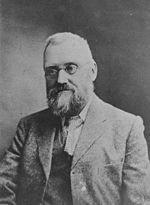William Farrer
| William Farrer | |
|---|---|

William Farrer
|
|
| Born | 3 April 1845 Docker, Westmorland, England |
| Died |
16 April 1906 (aged 61) Tharwa, New South Wales, Australia |
| Fields | agronomy |
| Alma mater | Cambridge University |
| Known for | Wheat breeding |
William James Farrer (3 April 1845 – 16 April 1906) was a leading Australian agronomist and plant breeder. Farrer is best remembered as the originator of the "Federation" strain of wheat, distributed in 1903. His work resulted in significant improvements in both the quality and crop yields of Australia's national wheat harvest, a contribution for which he earned the title 'father of the Australian wheat industry'.
Farrer was born on 3 April 1845 in the town of Docker, Westmorland in the English north west (now Cumbria). The son of Thomas Farrer, a tenant farmer, and his wife Sarah William, William Farrer was selected for a scholarship at Christ's Hospital, London where he was awarded a gold and silver medal for mathematics and soon earned a scholarship to Pembroke College where, after earning a B.A. at Pembroke College, Cambridge in 1868, Farrer emigrated to Australia in 1870. A sufferer of tuberculosis, Farrer hoped to find Australia's drier warmer climate more agreeable to his then delicate medical condition.
Initially, Farrer lived with friends at Parramatta but was later employed as a tutor in Duntroon then in regional NSW. In 1873 he published Grass and Sheep-farming A Paper: Speculative and Suggestive which dealt with the suitability of various soils for grasses and the scientific side of sheep-farming. After working as a tutor on George Campbell's sheep station at Duntroon, New South Wales (now part of the Australian Capital Territory), he qualified as a surveyor in 1875. Farrer worked for the Department of Lands in wheat growing districts of NSW from 1875–1886.
...
Wikipedia
